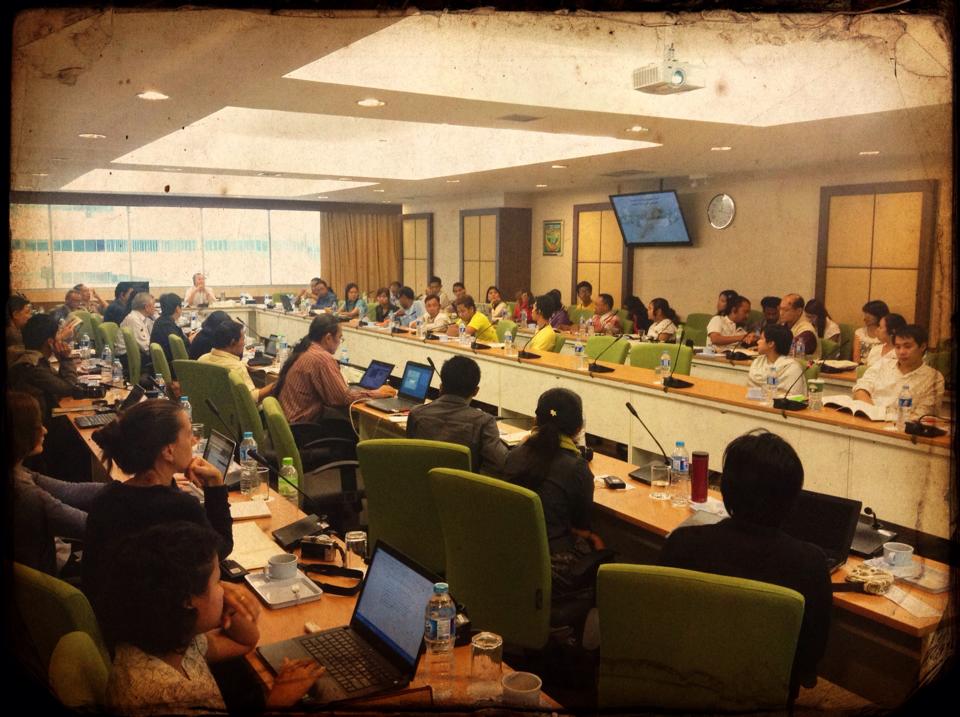Members of the Dawei Development Association (DDA), a rights watchdog monitoring the lurching progression of the Dawei Special Economic Zone (DSEZ) in Burma’s southern Tennasserim Division, tabled fresh findings to the Thai Human Rights Commission in Bangkok on Tuesday.
The DSEZ project, a deregulated industrial park that has the potential to become one of the largest petrochemical estates in Southeast Asia, was established in 2008 and is now a 50-50 joint partnership between the Burmese and Thai governments.
Construction at the site has come in piecemeal as the project has been passed from initial concession-holders, the Italian- Thai Development Pty (ITD) to a “Special Purpose Vehicle” set up by the Burmese and Thai governments.
In Bangkok on Tuesday, DDA alleged that planning and construction work undertaken thus far has come without the free, prior and informed consent of local stakeholders. In a report titled “Voices from the Ground”, the DDA presented research gatherings from impacted villages, home to as many as 40,000 people.
The DSEZ project has been previously accused of compromising the basic human rights of those people who are subject to displacement, land confiscation, and forced evictions as a result of clearing land for the project. The research and analysis in the DDA’s report concludes that the DSEZ partners did not adhere to relevant international, regional and domestic legal obligations or standards, including international standards on involuntary resettlement.
“The DSEZ project has proceeded without the free prior and informed consent of affected communities in violation of the rights of indigenous peoples,” the report reads.
Thant Zin, DDA coordinator, told DVB on Tuesday that the findings of the report contradict official statements made by the Burmese and Thai governments.
“When officials have previously released the data on people affected by the project, it did not include other related projects such as dam construction… so when we [DDA] calculated the number of people affected by the project, both direct and indirect, we see that there are thousands of local people left out by the official count.”
Thai and Burmese government have stepped up efforts of late into attracting potential investors for the Dawei project. Thai Prime Minister Prayut Chan-o-cha’s visit to Burma earlier in October was expected to give that push a timely boost.
Rumoured capital investment by Japan was to establish Tokyo as a joint developer in the Dawei SEZ, making it a trilateral deal between Burma, Thailand and Japan. However, despite all advances in securing investors and stakeholders, what remains largely ignored is the collateral damage incurred upon the people directly affected by the project.
The DDA’s report maintains that there is a severe information gap between those at ground level and project coordinators. The DDA found many potentially impacted people in the dark as to the project’s procedure. Indeed, the DDA figured that only 6 percent of the surveyed households were aware of the undertakings of the project.
[related]
“The local people were not informed of the project by the developers before initial construction work began, it is only when bulldozers came to the village to clear farmlands that they realised what was happening,” said Thant Zin.
The complex compensation process is further mudding the waters.
Payments are not in line with the damage incurred in terms of land loss and social and health impacts, the report says.
Some 71 percent of households in the area are expected to lose their land to the project. Despite this, DDA found that only 15 percent of households surveyed report receiving any compensation, out of which only three percent of people said they had received the full amount agreed.
The DDA report construes a deep sense of injustice among Dawei communities.
“Local people have expressed that they are not against development, but want development that is not harmful to people or the environment,” the report states.
DDA asserted that the report’s recommendations were aimed at preserving the rights of the local community affected by the Dawei project and has put forth the concerns before both the Thai and the Burmese governments. “The preservation of human rights is up to the state, which must not neglect to protect citizens. That is our message to both the governments of Thailand and Myanmar,” said Thant Zin
Thai officials, however, shrugged off any responsibility as to the impacts of DSEZ, telling the Thai National Human rights Commission that the “Burmese Government and the private firm that handled the Dawei project rather than the Thai government, should take responsibility for any repercussions the mega-industrial project may have on locals,” reported the Bangkok Post.



